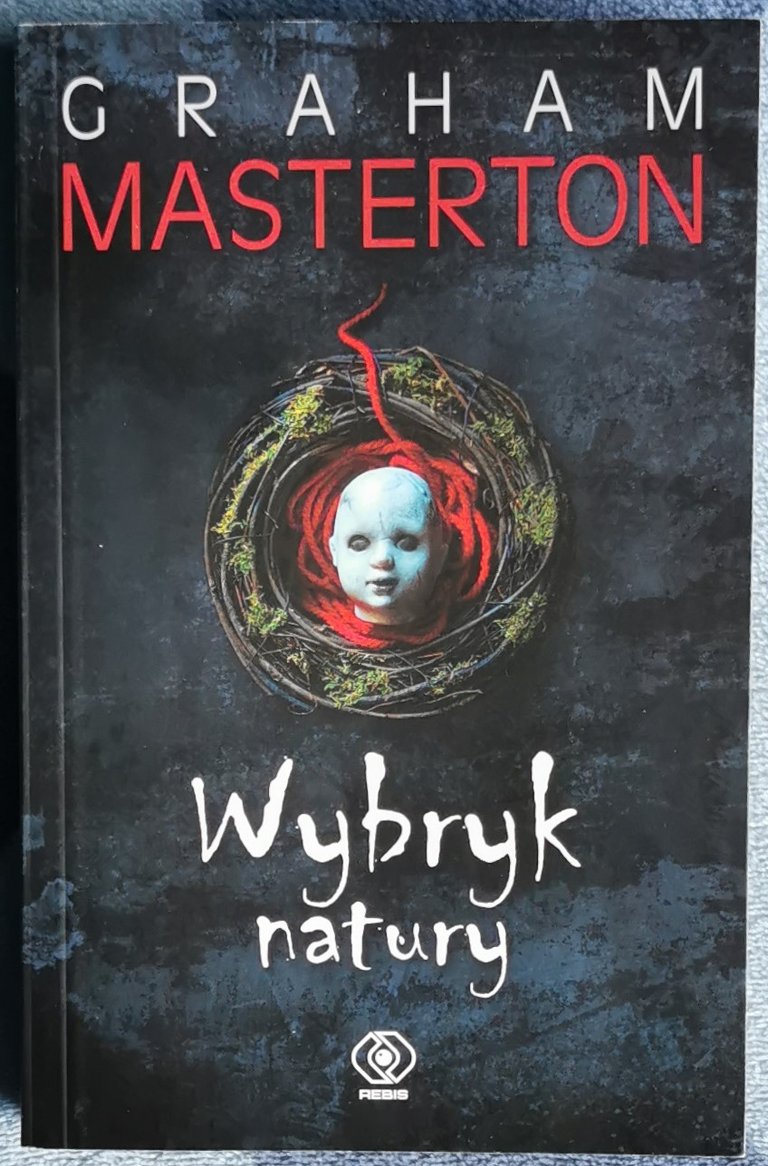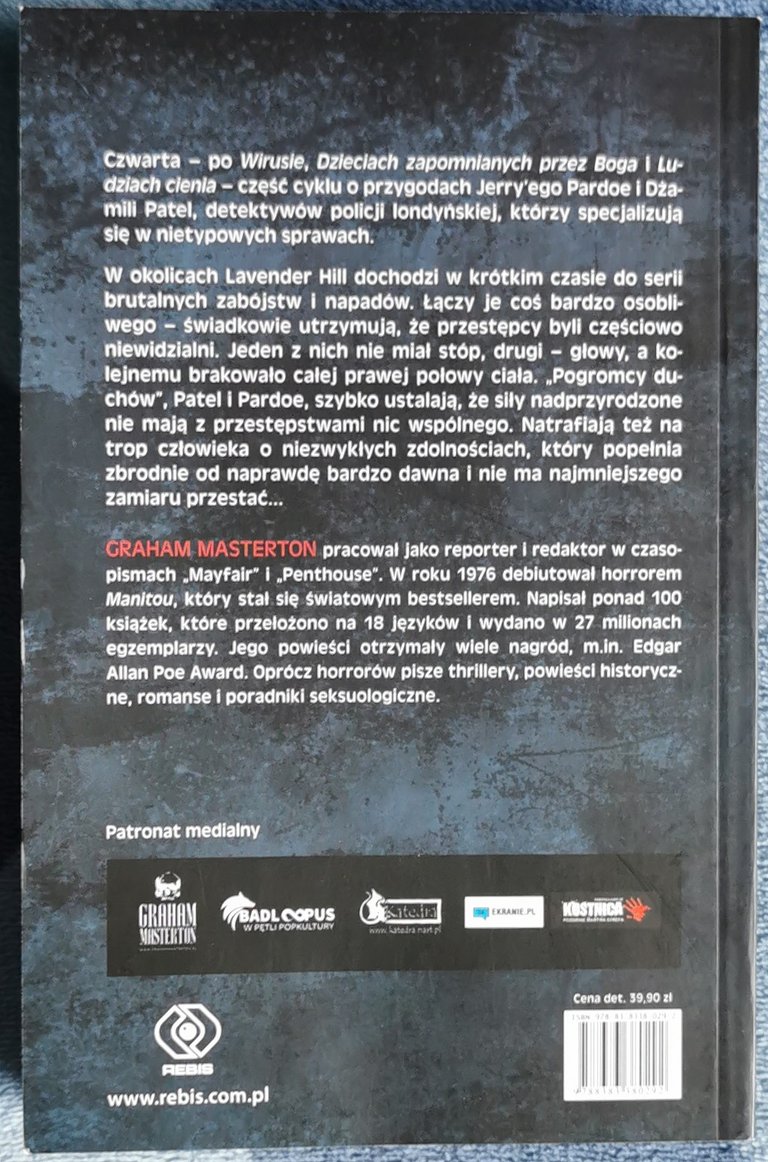| Kontynuujemy przygodę z Mastertonem, tym razem na tapet trafia „Wybryk natury”. W przeciwieństwie do „Sabatu czarownic”, tym razem do książki zabierałem się jak pies do jeża i długo czekała w kolejce – poprzednie tomy o londyńskiej policji, w których główne role odgrywali detektywi Pardoe i Patil, były, delikatnie mówiąc, słabe. No ale kiedy się już zna twórczość autora tak dokładnie, to dla porządku można zaryzykować i słabszą lekturę, więc ostatecznie nadszedł czas i na tę pozycję. | The Masterton adventure continues, this time with 'What Hides in the Cellar'. Unlike 'The Coven', this time I approached the book with trepidation and it waited a long time in the queue - the previous volumes featuring London police detectives Pardoe and Patil were, to put it mildly, weak. But when you know an author's work so well, you can take the risk of reading a weaker volume for good measure, so the time has finally come for this one as well. |
| Już na wstępie muszę zaznaczyć, że o ile również i tym razem mamy do czynienia z wątkiem nadprzyrodzonym, o ile i tym razem stanowi on główną oś utworu, to jednak porzucenie motywów biologicznych (fantastyczne stwory) na rzecz historycznych wyszło książce na dobre. A początek jest standardowy – Londyn nawiedza fala zbrodni: niewyjaśnionych i urągających logice. Ofiary giną w coraz brutalniejszy sposób, zaś sprawcy – jeśli w ogóle są widziani – są, nazwijmy to, niekompletni: czasem brakuje im stóp, czasem głowy, a czasem wręcz jednej strony ciała. Co więcej, zdarza się, że ludzie znikają bez śladu, a zeznania świadków – na pierwszy rzut oka – nie trzymają się kupy i przypominają brednie szaleńca. Nic więc dziwnego, że śledztwo zostaje powierzone parze detektywów, którzy już w przeszłości radzili sobie z takimi nadprzyrodzonymi wydarzeniami. | At the outset, I must point out that, as much as there is a supernatural plot this time again, and it is the main axis of the work, the abandonment of biological motifs (fantastic creatures) in favour of historical ones worked well for the book. The beginning is typical - London is plagued by a wave of crimes: unexplained and defying logic. The victims are killed in increasingly brutal ways, while the perpetrators - when seen at all - are, let's say, incomplete: sometimes they are missing feet, sometimes a head, sometimes even a side of the body. What's more, people sometimes disappear without a trace, and the testimony of witnesses is - at first glance - unconvincing, resembling the ravings of a madman. Not surprisingly, the investigation is entrusted to a pair of detectives who have dealt with such supernatural events in the past. |
| Ponieważ już po 2-3 stronach czytelnik jest w stanie zorientować się, na czym będzie polegać clou fabuły, nie ma sensu go ukrywać w omówieniu – tym razem autor postawił na wieloświaty, przenikanie się epok i podróże w czasie. Współczesny Londyn jest nawiedzany przez brutalnych przestępców sprzed wielu dziesiątek lat, zorganizowanych w szajkę kierowaną przez tajemniczego Pazura. To właśnie ten człowiek, kryjący się w jednej z piwnic w wojennym roku 1941 posiada zdolność manipulowania czasem i wykorzystywania tego dla przestępczych celów. | Since the reader can tell after 2-3 pages what the main plot point is going to be, there is no point in hiding it in the discussion - this time the author has set his sights on multiverses, intertwining epochs and time travel. Violent criminals from many decades ago, organised into a gang led by the mysterious Scratch, haunt modern London. It is he, hiding in a cellar in wartime 1941, who has the ability to manipulate time and use it for criminal purposes. |
| Detektywów czeka zadanie trudniejsze, niż zwykle – próby złapania przestępców w świecie współczesnym są nieskuteczne (a nawet jeśli się to już uda – znikają z celi aresztu, rozpływając się w czasie). By ich dopaść i jednocześnie wymierzyć im sprawiedliwość (normalnych procedur nie da się przeprowadzić), sami muszą nauczyć się cofać w czasie, w czym pomoże im pies policyjny o niezwykłych zdolnościach. Jednocześnie żyją w ciągłym zagrożeniu, bo Pazur może nasłać na nich swoich zbirów w dowolnym czasie i miejscu. | The detectives are faced with a more difficult task than usual - attempts to catch criminals in the modern world are ineffective (and even when they succeed, the gang members disappear from their cells in jail and vanish into time). In order to catch them and serve them justice (normal procedures cannot be followed), they must learn to go back in time themselves, aided by a police dog with extraordinary abilities. At the same time, they live in constant danger, as Scratch can send his thugs after them at any time and any place. |
| Niewątpliwie jest to książka dla twórczości Mastertona dość ożywcza – motyw podróży w czasie nie był dotychczas specjalnie eksploatowany (jeśli w ogóle). Do tego jak zwykle na dobrym poziomie jest opis innych epok, a miłośnicy brytyjskiej kultury docenią też nawiązania do Dickensa i historii Człowieka-Słonia. Wszystko to powoduje, że tym razem lektura wymaga przymknięcia oka na to, co nadprzyrodzone i niewiarygodne, w znacznie mniejszym stopniu, niż przy poprzednich książkach tego cyklu – i nawet da się z tego czerpać pewną przyjemność. Z drugiej strony – jednak szczyt możliwości Mastertona leży troszkę wyżej, więc wciąż jest możliwość poprawy w kolejnej części. I z taką nadzieją sięgnę po nią, gdy już się ukaże. Dla „Wybryku natury” ocena 6,5 (niezły/dobry). | Undoubtedly, this is a rather invigorating book for Masterton's oeuvre - the time travel motif has not been exploited much (if at all) before. In addition, the description of other eras is, as usual, of a good standard. Lovers of British culture will also appreciate the references to Dickens and the story of the Elephant Man. All of this means that this time you have to turn a blind eye to the supernatural and the unbelievable to a much lesser extent than in previous books in the series. And you can even take some pleasure in that. On the other hand, the peak of Masterton's possibilities lies a little higher, so there is still room for improvement in the next part. And it is with this hope that I will reach for it when it is published. My rating for "What Hides in the Cellar" is 6.5 (not bad/good). |


